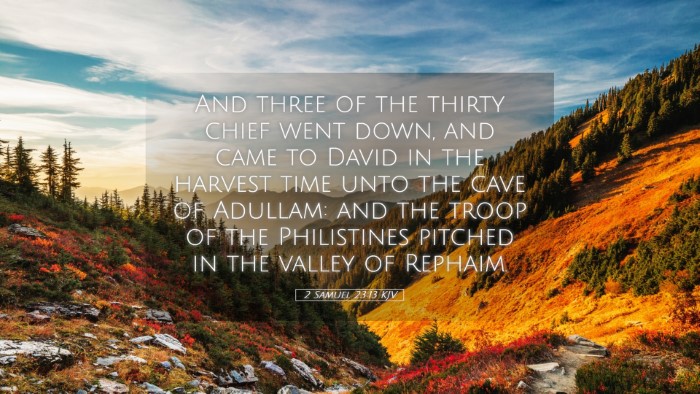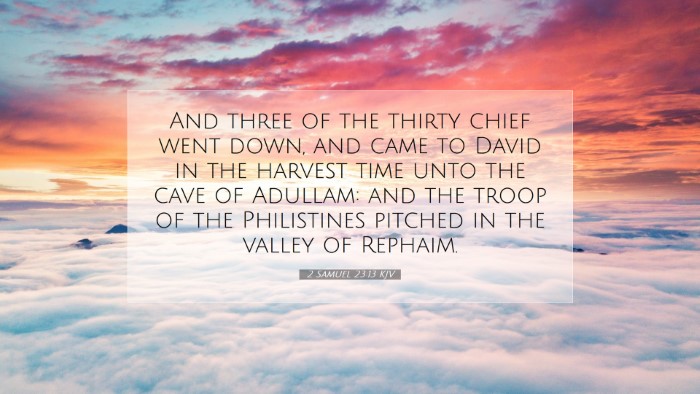Commentary on 2 Samuel 23:13
Verse Context: 2 Samuel 23:13 states, "And three of the thirty chief went down, and came to David in the harvest time unto the cave of Adullam: and the troop of the Philistines pitched in the valley of Rephaim." This verse comes from a significant period in David's life, depicting his rise amid adversity and the loyalty of his closest men.
General Overview
This verse is crucial as it illustrates the dedication of David's warriors and the challenges he faced from the Philistines. The mention of the "three of the thirty chief" refers to a select group of David's elite warriors, emphasizing their commitment to him during perilous times.
Insights from Henry's Commentary
Matthew Henry offers profound insights regarding the circumstances surrounding this verse. He expounds on the cave of Adullam as a place of refuge and God's providence during David's struggles. Henry notes:
- The significance of the cave: Adullam symbolizes a stage of transition and preparation for David, where he moved from a fugitive to a future king.
- Spiritual Interpretation: The cave also represents the trials that believers endure before they attain true leadership, paralleling David's journey.
- Harvest Time: This aspect underscores that even during periods of personal trials, there exists a season of spiritual and physical productivity.
Insights from Barnes' Commentary
Albert Barnes adds depth to our understanding by exploring the historical context of this encounter. He notes that the Valley of Rephaim was a pivotal battlefield against the Philistines:
- Leadership Dynamics: The action of the "three chief men" illustrates the loyal support that David garnered, offering a model of faithful leadership that remains relevant in pastoral roles today.
- Philistine Oppression: The Philistines' rule over Israel is interpreted as a symbol of sin and opposition to God, indicating the need for a leader like David to emerge and guide the people back to righteousness.
- Symbol of Harvest: The mention of "harvest" serves as a reminder of the blessings that follow when one remains faithful amidst trials, reinforcing the principle of divine reward following perseverance.
Insights from Clarke's Commentary
Adam Clarke further contributes to the discussion by providing a thorough analysis of the linguistic and cultural context of this verse:
- Understanding "three of the thirty": Clarke emphasizes the significance of their number; these three represent the peak of valor and loyalty among David's ranks.
- Cave as a Symbol: Adullam, as a cave, represents anonymity and divine seclusion, serving as a metaphorical place where God can prepare leaders away from the public eye.
- Challenges of Leadership: Clarke discusses the inherent challenges leaders must face, drawing parallels to David’s situation, where even in the darkest times, faith in God and the support of trusted allies are indispensable.
Theological Implications
This passage bears rich theological implications for both clergy and laypersons. Key points include:
- The Value of Community: The bond between David and his warriors reflects the importance of community in faith; they ministered to one another in times of dire need.
- God's Provision in Adversity: The narrative illustrates that God often provides refuge and support in unexpected places, paralleling the biblical theme of divine help during trials.
- Typology of Christ: David is often seen as a type of Christ; this episode serves as a foreshadowing of Christ’s own experiences of rejection and the loyalty of His followers.
Practical Application
For contemporary believers, especially pastors and theologians, 2 Samuel 23:13 serves as a call to:
- Embrace Vulnerability: Understanding that leaders may find themselves in caves of adversity, yet it is during these times that God’s preparation is most profound.
- Cultivate Loyalty: Building a community that mirrors the loyalty of David’s men is crucial; leaders should seek to foster relationships based on mutual support and commitment.
- Recognize Divine Timing: Like the harvest, God’s blessings come in due season; maintaining faith during trials is essential for eventual fruitfulness.
Conclusion
In conclusion, 2 Samuel 23:13 not only captures a historical moment but also conveys timeless lessons in faith, leadership, and community. The combined insights from Matthew Henry, Albert Barnes, and Adam Clarke offer a multifaceted understanding that enriches the spiritual journey of all readers. This verse beckons us to remember that even in the darkest caves of life, God is preparing leaders for greater purposes.


